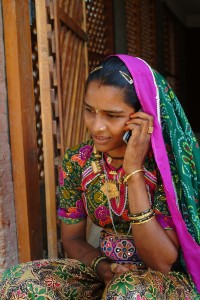The following is a guest post we’re pleased to share by Valerie Rozycki, Head of Strategic Initiatives at mChek.
 A low-income woman walks into a bank branch in Bangalore, India, with the intention of opening a bank account. Mubeena Taj does not speak or read English, but the bank account opening forms are bilingual, so she can manage with her limited Hindi reading. She is a very low-income customer and not one who helps the bank’s profit margins, but the Reserve Bank of India has mandated that all banks make available a No Frills savings Account which requires zero minimum balance and can be opened with reduced KYC requirements. Mubeena has never before entered a bank branch, but she is highly encouraged because of her experience as a part of a year-long mobile banking and cash-free microfinance pilot run by mChek, mobile payments technology provider, and Grameen Koota, a microfinance institution. Having experienced the security and efficiency of mobile money and its benefits over cash, Mubeena does not want to wait until the coming commercial scale up of the pilot. She wants her bank account now.
A low-income woman walks into a bank branch in Bangalore, India, with the intention of opening a bank account. Mubeena Taj does not speak or read English, but the bank account opening forms are bilingual, so she can manage with her limited Hindi reading. She is a very low-income customer and not one who helps the bank’s profit margins, but the Reserve Bank of India has mandated that all banks make available a No Frills savings Account which requires zero minimum balance and can be opened with reduced KYC requirements. Mubeena has never before entered a bank branch, but she is highly encouraged because of her experience as a part of a year-long mobile banking and cash-free microfinance pilot run by mChek, mobile payments technology provider, and Grameen Koota, a microfinance institution. Having experienced the security and efficiency of mobile money and its benefits over cash, Mubeena does not want to wait until the coming commercial scale up of the pilot. She wants her bank account now.
While the scenario is relatively encouraging for Mubeena, there are other more subtle barriers which ultimately lead to a failed experience.
Being Muslim, Mubeena is wearing her burqa, as she always does when outside of her home. This was unacceptable to the bank branch staff because they could not verify photographs and KYC documentation. So she began to remove her burqa (being completely clothed and nicely dressed underneath), yet what embarrassment for all the men staff at the branch! A flurry of phone calls from the bank to Grameen Koota and mChek ensue, and the Mubeena is sent home.
This is a true story of Mubeena Taj, a resident in a slum area of Bangalore, India, called Neelasandra. She is a mother of four and runs a bag-making business. Mubeena’s bags sell to shop owners for 35 Indian rupees (approximately 80 cents USD), earning her a profit after material costs of only 5 rupees. The shop owners then sell them for up to 140 rupees. Having been widowed over a decade ago, Mubeena has brought up her family on her own. She is now only 34 years old.
A strong and perseverant woman like Mubeena Taj was not deterred by the disappointment at the bank branch, but this story highlights some subtle barriers for unbanked customers who want to engage in traditional modes of banking – especially for women.
With regards to well-known barriers to engaging in banking, women are often more strongly affected. Literacy rates, for example, are worse for women in developing countries where girls are less likely to be the beneficiaries of family resources than boys, girls often stop going to school once they reach puberty and women are less likely to work, especially after marriage. In India, for example, the United Nations Population Fund (UNFPA) estimates that in 2009 the literacy rate for men above age 15 in India was 76.9%, but only 54.5% for women.
In addition to these known barriers, women are often more greatly affected by hidden barriers. It is one thing to be unfamiliar with bank branches and be intimidated to approach them, but for many women, this hindrance is amplified when interactions at a bank branch go against traditional expectations of privacy and decency.
Having access to branchless banking agents nearby in villages or urban neighbourhoods not only provides simpler, lower-costs access for customers to do banking, but the story of Mubeena Taj highlights how local access can also provide a level of familiarity and comfort that helps encourage the adoption of bank accounts, especially among women.
As Head of Strategic Initiatives at mChek, Valerie Rozycki is responsible for building the company’s business around mobile payments and security for the Bottom of the Pyramid market segment of India and other countries. Valerie earned her B.A. in Public Policy and M.A. in Economic Sociology at Stanford University. www.twitter.com/valrozycki

